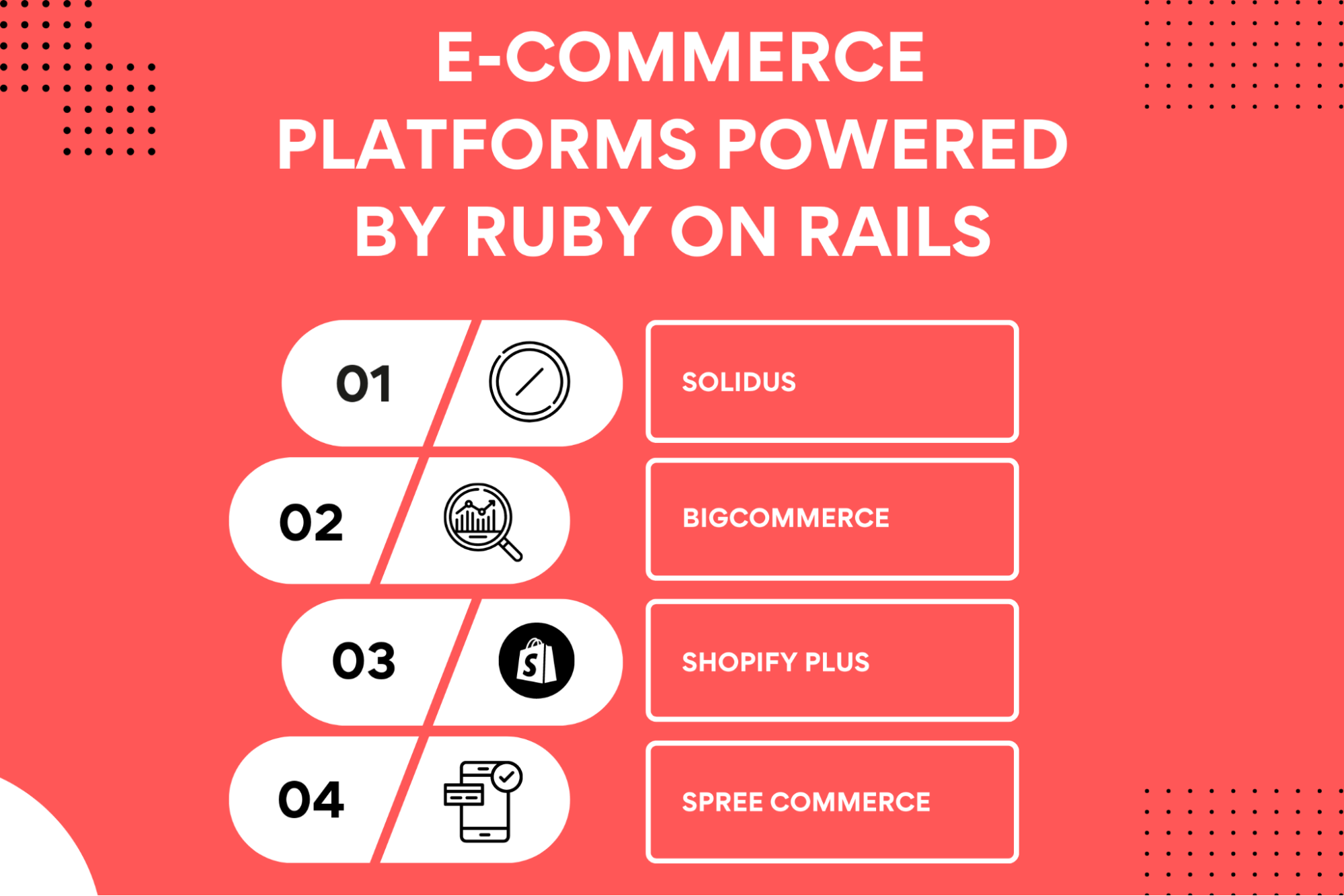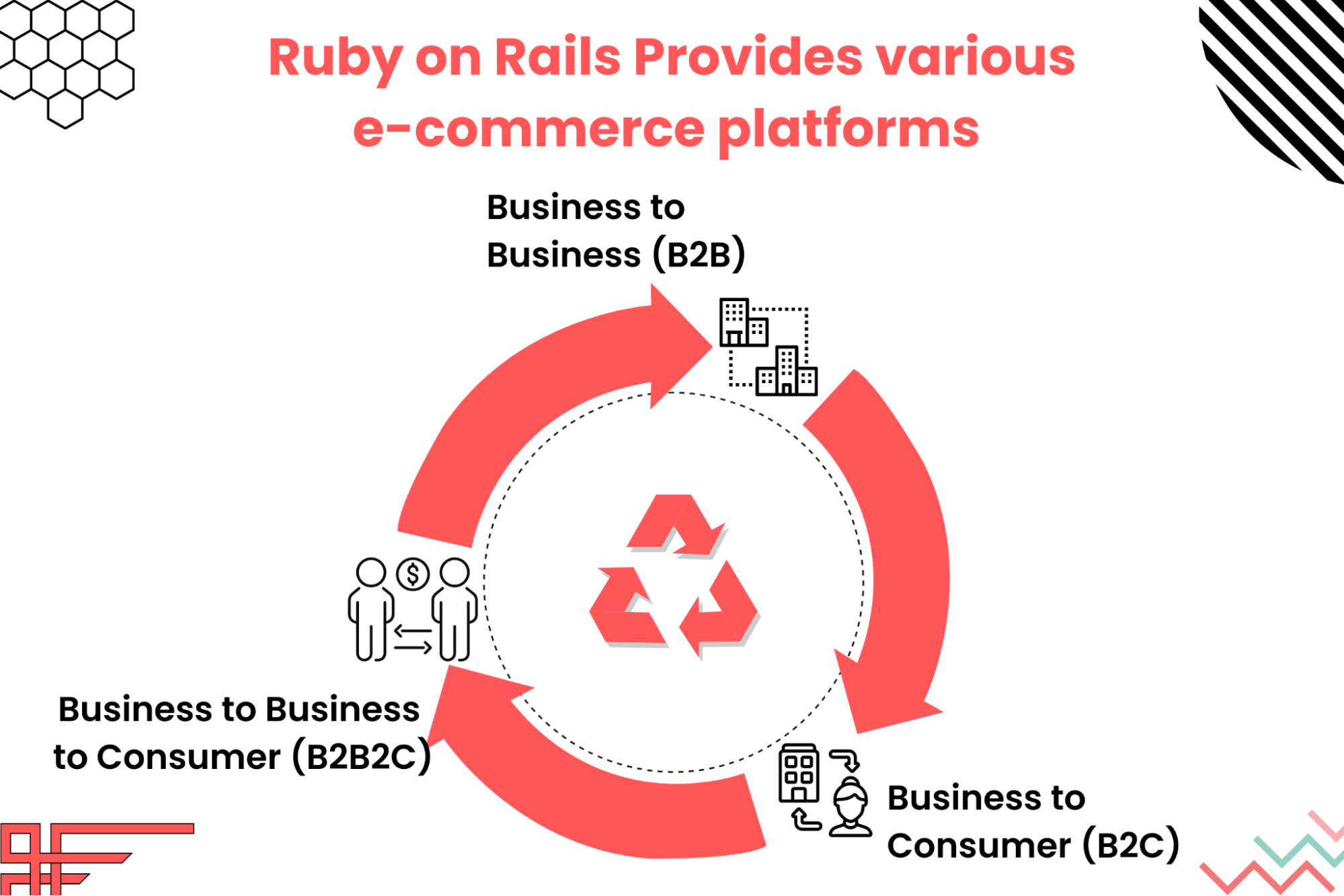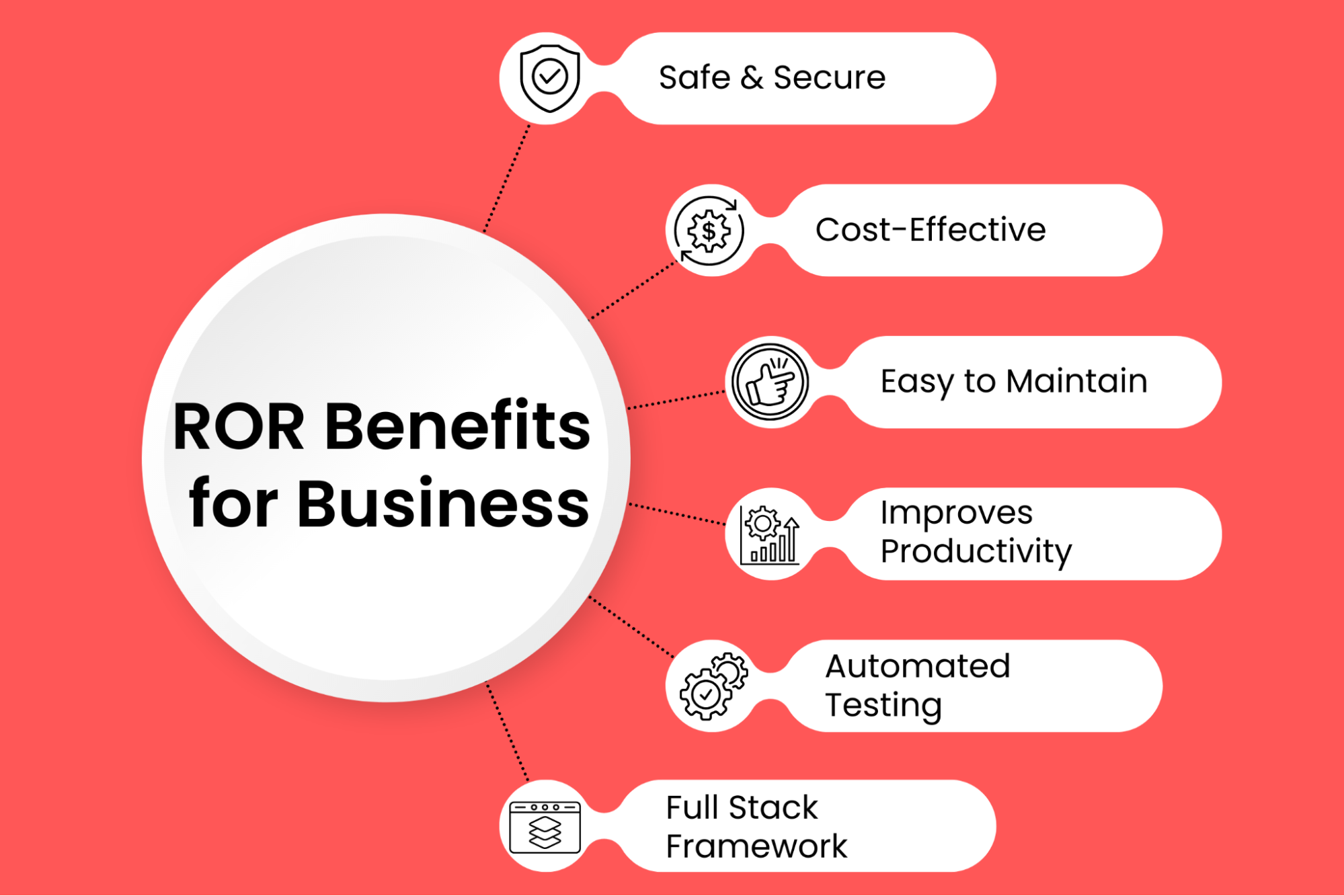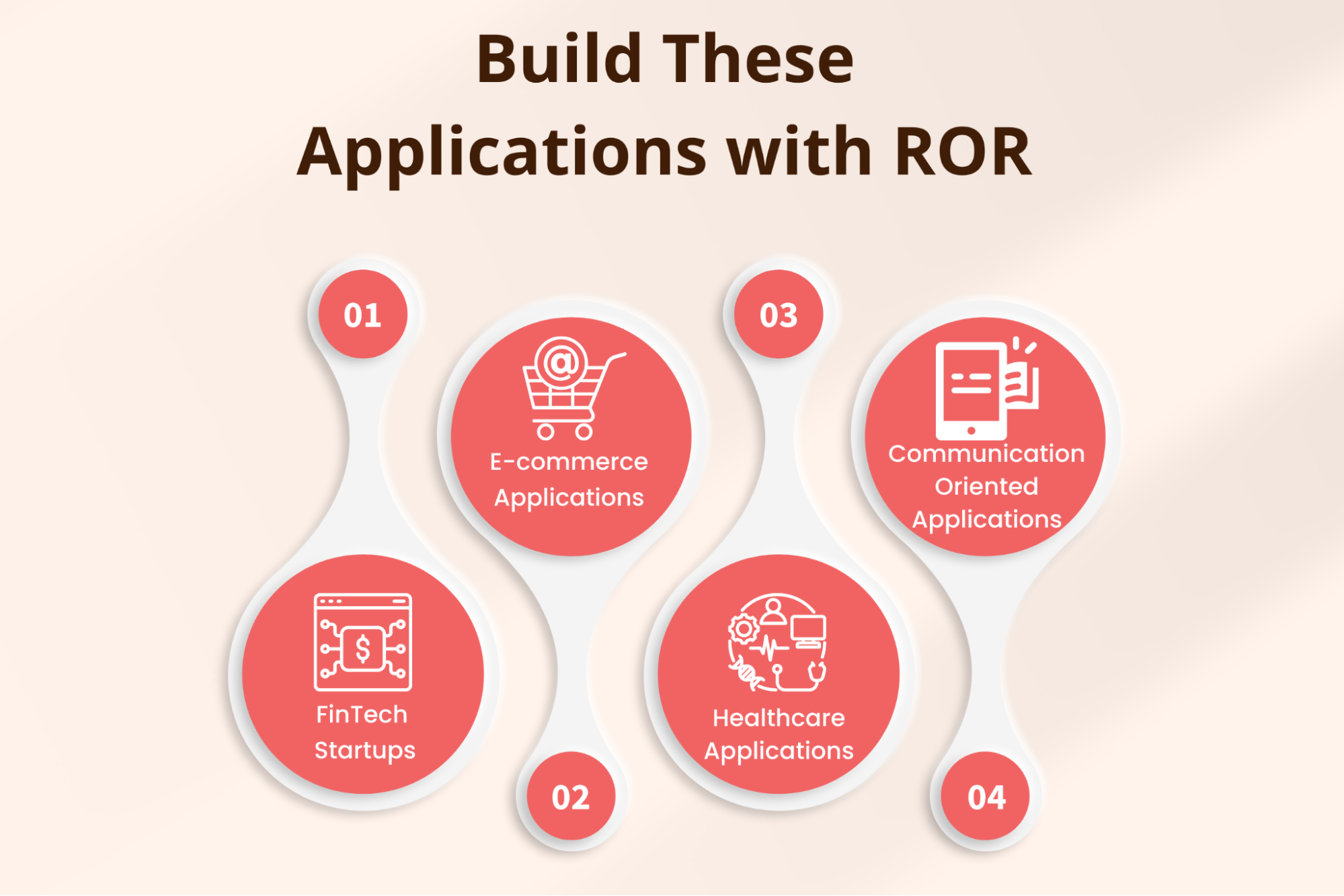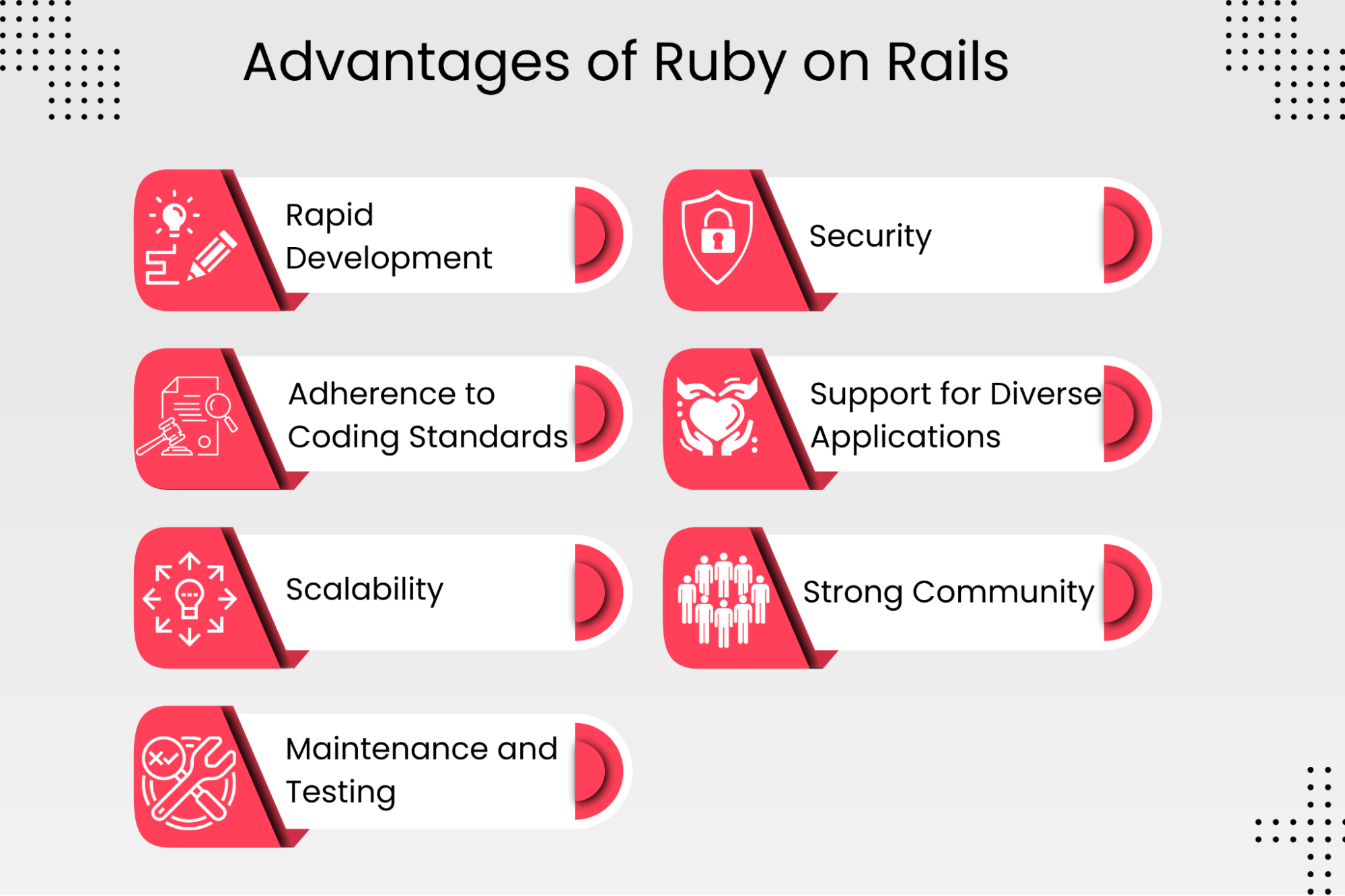To create a rich and dynamic website, it’s essential to choose a sturdy and flexible development platform such as Ruby on Rails (RoR). E-commerce projects thrive with RoR’s support, as it utilizes the MVC (model-view-controller) process, which covers many aspects of e-commerce development. The MVC architectural pattern breaks down an application’s logic into three core components: models, views, and controllers. This separation is a significant benefit of the language, allowing developers to modify individual parts quickly without altering the others. The RoR web application framework stands out as it employs the Ruby programming language, one of the finest object-oriented languages.
E-Commerce Platforms Based on Ruby on Rails
RoR has revolutionized the web application development process, enhancing efficiency. This has led businesses globally to employ RoR for e-commerce websites. RoR assists companies in swiftly establishing and managing their online stores to bolster their business. With various Rails platforms available, one can choose the best one that caters to their needs, complete with beneficial features. The diverse tools and plugins simplify website management, minimizing complexity. This technology allows businesses to concentrate on optimal development, saving both time and money. Some notable RoR e-commerce platforms include:
Solidus: An all-inclusive, open-source e-commerce platform with all the features necessary to build an online shopping portal on Ruby on Rails.
BigCommerce: Offers customization, enabling unique website design without coding. It helps in crafting a distinctive online presence.
Shopify Plus: Supports both online and physical sales, featuring a customizable shopping cart for quick online store setup.
Spree Commerce: Facilitates the speedy development of e-commerce sites, providing a highly adaptable RoR shopping cart system with multiple features.
Types of Ruby on Rails E-Commerce Platforms
Ruby on Rails offers various e-commerce platforms
RoR e-commerce platforms are ideally suited for both B2C and B2B models, other available RoR e-commerce platforms include:
Business to Business (B2B): This model directly offers online e-commerce products and services to other businesses, bypassing end consumers.
Business to Consumer (B2C): Here, e-commerce websites target customers directly, offering them a superior online shopping experience and direct product purchasing options.
Subscription-based: This model allows customers to buy products on a subscription basis, providing ongoing access to goods or services.
Business to Business to Consumer (B2B2C): B2B2C strategies provide products and services directly to consumers, either through direct sales channels or affiliate marketing.”
This revised version organizes the information into sections, making it easier to understand the different aspects of Ruby on Rails in e-commerce.
Why Do Businesses Need Ruby on Rails?
Ruby on Rails (RoR) boasts a codebase that’s been contributed to by over 5,000 individuals, solidifying its position as a well-maintained and robust open-source framework. This vast contributor base is made up of many RoR developers who actively keep pace with the latest updates, continually enhancing the framework to be more versatile and dynamic.
Furthermore, RoR excels in handling repetitive tasks and allows for rapid iterations, thereby speeding up the development process. This efficiency enables you to quickly code and structure both Proof of Concept (POC) and Minimum Viable Product (MVP), making the development journey smoother and more agile.
Below are some key reasons why selecting Ruby on Rails for web development might be the right choice for you:
Let’s explore some key advantages of Ruby on Rails (RoR) that make it an appealing choice for startups across various industries:
Safe & Secure
Security is paramount for any online business, and RoR has got it covered with its multiple built-in safety measures. It not only ensures safety but also supports both behavior-driven development and test-driven development, adding layers of robustness.
Cost-Effective
Budget and timeline constraints are common challenges for startups. RoR, being an open-source framework that functions seamlessly on Linux (a free and open-source operating system), provides an economical solution that helps in completing projects on time and within budget.
Easy to Maintain
RoR emphasizes efficient coding and reliability. Its various components enable developers to refine coding styles, enhance test codes, and fix bugs promptly. This ease of management and maintenance is a standout feature of RoR. Moreover, finding skilled RoR developers is not a challenge, as there are many readily available in the market.
Improves Productivity
RoR’s expressive yet succinct syntax, when coupled with numerous third-party libraries, facilitates rapid feature building. This combination makes RoR one of the most productive and developer-friendly programming languages available.
Automated Testing
If rapid project completion is your goal, RoR should be your choice. It emphasizes testing and offers an automated test process. RoR development companies typically test the entire code before implementation, and you won’t need a third-party testing tool, making the process more streamlined.
Full Stack Framework
Whether you’re in healthcare, Oil & Gas, or logistics, RoR’s full-stack framework is suitable for virtually all types of industry verticals. Its comprehensive nature ensures that it can cater to a wide array of business needs and sectors.
These distinctive advantages of RoR position it as a top choice for those looking to develop secure, cost-effective, and efficient web solutions, particularly for startups and emerging enterprises.
What Can Be Built with Ruby on Rails?
Ruby on Rails (RoR) is an incredibly versatile framework that has proven its worth in various sectors. Let’s take a closer look at some of the areas where RoR can be utilized:
FinTech Startups
Entrepreneurs venturing into financial technology might be surprised by the applicability of RoR in this field. It’s not only useful but also enhances efficiency in dealing with the significant challenges of FinTech app development. RoR can ensure flawless project delivery. To reap these benefits, all that’s needed is to find a market expert that fits your budget. Examples of its use in FinTech include:
Squareup: A payment service
Fundera: A B2B lending service
E-commerce Applications
RoR has made significant inroads in various industries, including e-commerce. When you think of RoR and e-commerce, Shopify likely comes to mind. RoR offers an e-commerce-centered ecosystem complete with dedicated gems, a customer management system, and fully functional e-commerce capabilities. Other notable e-commerce apps using RoR are Brandless, Etsy, Instacart, and many more.
Healthcare Applications
Accurate communication is vital in healthcare, and many hospitals rely on software applications to track records. RoR excels here with its concise code and extensive library, backed by robust community support. Its precision makes it the perfect choice for rapid application development within the healthcare sector.
Communication-Oriented Applications
Did you know that Twitter was initially built using RoR? Although it later transitioned to a distributed message broadcasting system, RoR’s impact in communication-oriented applications is significant. Other examples in this category include Dribbble and Basecamp.
The versatility of Ruby on Rails does not stop here; this technology has extended its reach to nearly every industry. Its adaptability, efficiency, and robust community support make it a go-to choice for various types of development projects, from startups to established enterprises. Whether you’re building a complex FinTech platform or a streamlined e-commerce site, RoR has the tools and capabilities to bring your vision to life.
Advantages of Ruby on Rails
Ruby on Rails brings the following top seven benefits to software developers and product owners:
Fast Development
Ruby on Rails enables accelerated application development. Its ready-to-use libraries and plugins, known as gems, allow developers to create app functionalities swiftly. A substantial portion of the code base is also open-source.
The absence of boilerplate code and the simplicity of syntax mean more can be achieved with fewer lines of code. Developers using Ruby on Rails typically experience a 30-40% reduction in development time compared to other languages and frameworks.
Adherence to Coding Standards
Ruby on Rails adheres to standard code and application design principles, enabling developers to construct high-performance applications efficiently.
Coding principles like “conventions over configurations” and “don’t repeat yourself” (DRY) enable developers to concentrate on more vital tasks, leading to easier code maintenance and fewer errors.
Ruby on Rails also supports code optimization, with modules managing intricate data requirements and complex computations.
Scalability
Creating scalable applications is a priority for developers. Ruby on Rails performs well with increased user requests, as the server-side code can directly process these requests.
For instance, Shopify, built on Ruby on Rails, seamlessly serves over 300,000 customers.
Maintenance and Testing
Ruby on Rails uses a model-view-controller (MVC) architecture, which improves code testing and maintenance. It also assists developers with asynchronous programming techniques for dynamic websites.
Additionally, it includes a comprehensive testing suite, and the Minitest tool, and supports test-driven development (TDD) and behavior-driven development (BDD), making development more cost-effective and efficient.
Security
Ruby on Rails has evolved into a stable framework with various built-in security features. It offers protection against threats like cross-site scripting, SQL injections, insecure direct object references, social engineering attacks, and more.
Support for Diverse Applications
Ruby on Rails, as a full-stack framework, is employed across various industries, including e-commerce, entertainment, fintech, and healthcare. It’s suitable for long-term projects needing high scalability, such as content management systems and social networking sites. It presents an innovative and relatively simple database-backend alternative for efficient and budget-friendly web application development.
Strong Community
As an open-source framework, Ruby on Rails boasts a vibrant community of developers contributing to its code base. It has one of the largest communities on GitHub, making it a major code repository.
In conclusion, Ruby on Rails offers an impressive array of advantages, making it a prominent choice for developers and business owners alike.
Top Reasons to Choose Ruby on Rails for ECommerce Development
Wondering what makes Ruby on Rails stand out for eCommerce web application development? Here are the distinctive features that set it apart:
Cost-Effectiveness
Rails offer a free framework for individuals and businesses alike. With compatibility across various free web servers and databases, it’s a financially viable option. Ruby on Rails enhances the project’s cost-effectiveness, whether you’re working on a regular website, project management system, or an eCommerce platform.
Rapid Development
Startups gravitate towards Ruby on Rails due to its speed in development, especially under stringent timelines. All applications developed with Rails follow a similar structure, aiding in integrating new engineers into the project effortlessly. Entrepreneurs often favor Rails for rapid web development. Using this framework, a small team can quickly create an MVP and transition to a beta version of the product, something not easily achievable with alternatives like .NET or Java Spring.
Flexibility
Ruby on Rails’ various modules enable the creation of customizable e-commerce applications. With over 150K pre-defined software packages known as gems, implementing changes and new functionalities is a breeze.
Ruby on Rails’ flexibility also lets you concentrate on developing an MVP, allowing you to test assumptions about your eCommerce business quickly. In other words, Rails provides the opportunity to adapt and create solutions with complex ecosystems effortlessly.
Highly Secure
Online sales transactions involve sensitive information, such as email addresses, payment details, and more. Ensuring this data’s security is paramount. Ruby on Rails addresses this concern by allowing the signing and encrypting of cookies and providing in-built measures against SQL injection.
Moreover, the Ruby on Rails community offers specialized gems, like Brakeman, for online stores to bolster fraud protection, detect security vulnerabilities, and protect payment details.
Reliability
To enhance an application’s reliability, it’s essential to minimize possible failures and maintain regular updates. Unreliable products often lead to customer dissatisfaction. Ruby on Rails eCommerce solutions, however, can be reliable if tested thoroughly prior to launch.
The CyberCraft team ensures this by testing developed eCommerce solutions, eliminating bugs, and checking for potential high-load issues that might hinder the product’s success.
Scalability
Scalability in the context of eCommerce Ruby on Rails platforms refers to the ability to efficiently manage multiple user requests and adapt to business growth. It’s possible to scale an eCommerce application to accommodate more traffic when needed, with automation and ready-to-use blocks to expedite the process. Options like payment gateways or checkout settings require minimal developers’ time, allowing you to focus on other aspects of development or even choose fully stocked eCommerce frameworks as an alternative.
Advantages of Engaging Ruby on Rails Developers
Swift Development: Ruby on Rails’s modular design and smaller codebase enable rapid website creation and adjustments after launch. This framework simplifies the development of even the most complex websites.
Cost Efficiency: Ruby on Rails is a budget-friendly option for organizations, allowing them to engage remote experts from well-known Staff Augmentation firms like CloudVandana. This strategy enhances efficiency while reducing expenses, including those related to infrastructure and recruitment.
Enhanced Flexibility: The ready-made framework of Ruby on Rails provides significant adaptability in development. Its user-friendly interface is easily managed by newcomers, allowing for both flexibility and cost savings.
Pre-Configured Modules and Plugins: Ruby’s array of pre-existing modules and plugins enables developers to quickly create basic applications without redundant coding. Rails applications are up to 40% faster than those built on other frameworks.
Scalability: Built for success and increased visitor engagement, this online application framework provides scalability that helps businesses stay ahead of their competition. Projects can be scaled based on customer needs.
Value Generation Through Rails: Ruby developers can offer organizations a unique experience by devising innovative solutions. Selecting the right Ruby on Rails team can lead to the creation of valuable assets that provide a competitive edge.
Open Source and Security: When skilled developers work on a Rails application, they adhere to a secure Development Lifecycle. This process ensures comprehensive security for the entire web application.
Outstanding Support: Ruby boasts one of the most vibrant communities globally, with members regularly updating blogs, writing books, and holding conferences. This active participation helps developers continually enhance their knowledge and provide better support.
Conclusion
To conclude, we can say that the transformative power of Ruby on Rails in the eCommerce industry cannot be overstated. By providing a robust, flexible, and efficient framework, RoR has emerged as a vital tool for businesses aiming to innovate and streamline their online platforms. Its modular design, coupled with a rich library and community support, has made it a preferred choice for developers, including our team of experienced developers who work with various tech stacks.
The utilization of RoR in eCommerce has enabled businesses to quickly adapt to the ever-changing market dynamics, offering scalable solutions that align with customer needs. The beauty of RoR lies in its ability to simplify complex tasks, reduce development time, and enhance the overall user experience. Through elegant coding and adherence to the DRY (Don’t Repeat Yourself) principle, RoR developers have achieved remarkable feats in creating responsive, secure, and visually appealing online stores.
Moreover, RoR’s compatibility with various payment gateways, SEO friendliness, and ease of integration with other tools and platforms make it an all-in-one solution for eCommerce development. Whether it’s a small startup or a well-established enterprise, the flexibility of RoR ensures that it can meet the unique requirements of any business.
Our Indian company, with its team of dedicated and skilled RoR developers, is at the forefront of this transformation. We have seen firsthand how RoR has revolutionized the way online businesses operate, offering a more personalized, efficient, and interactive experience for both vendors and customers. With continued innovation and commitment to excellence, Ruby on Rails is set to continue shaping the future of eCommerce, further solidifying its position as a leading framework in the world of web development.

